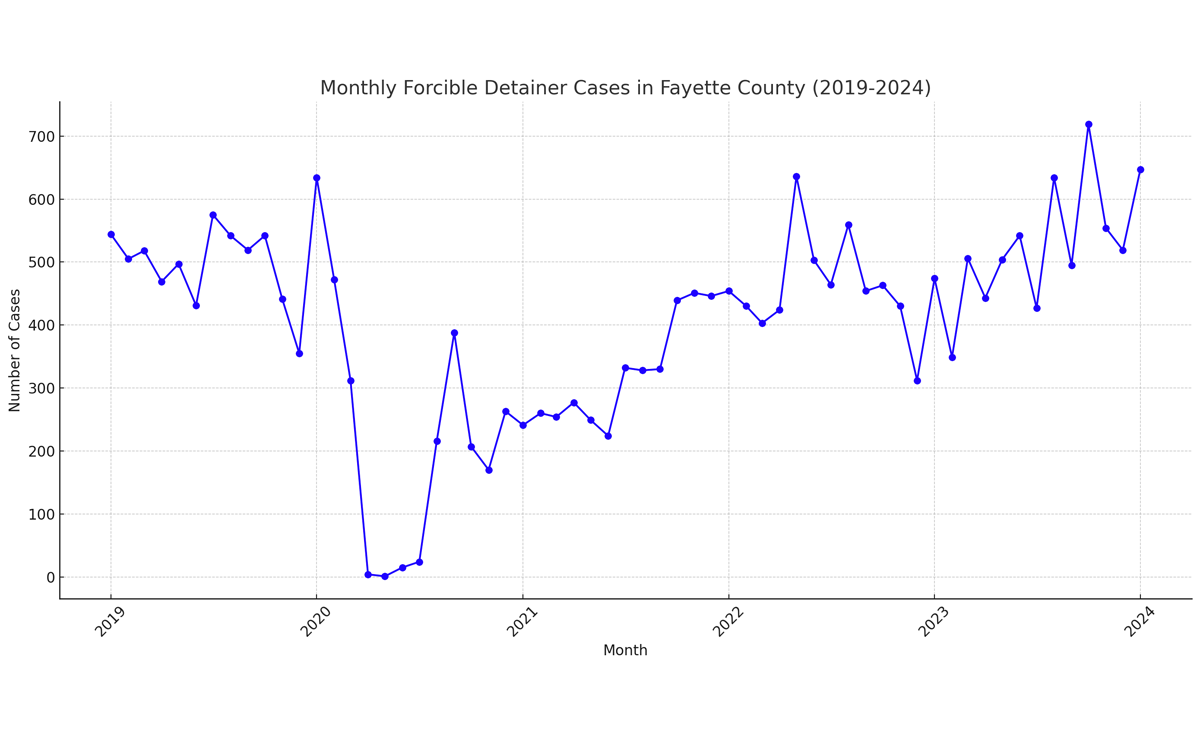Evictions surge in Lexington, as pandemic-era assistance programs run out

LEXINGTON, Ky.–A report released Tuesday by the Commonwealth of Kentucky Court of Justice revealed eviction cases in Fayette County have returned to pre-pandemic levels. The report details forcible detainer cases filed between January 2019 through January 2024, revealing significant fluctuations in case numbers that underscore the challenges residents face in securing stable housing amid evolving assistance programs and legislative landscapes.

The data indicate a noticeable dip in eviction cases during the COVID-19 Federal Eviction Moratorium, which lasted from March 27, 2020, to Aug. 23, 2020. Additionally, the Housing Stabilization Program, fully operational from 2021 to 2022, played a crucial role in assisting tenants with rent and utility backpay and provided court mediation services. However, in 2023, eligibility requirements tightened to include only those with an active eviction case. Program rent funds were fully exhausted at the end of November 2023, as concerns loomed large over an anticipated rise in eviction cases, reflecting the critical role such assistance programs play in maintaining housing stability.

In parallel, the limitations of the Section 8 Housing Choice Voucher program have come under scrutiny. According to a January 23 presentation by Charlie Lanter, Commissioner of Housing Advocacy & Community Development, to the Social Services and Public Safety Committee, “the Lexington Housing Authority has 3,567 vouchers but there are 3,764 households on the waiting list for vouchers or public housing and thousands more are eligible but will likely never receive assistance.”
With the waiting list opening merely once a year and wait times often extending beyond a year, the hurdles for those seeking assistance are palpable. This bottleneck effect underscores the need for a more accessible and responsive housing assistance framework to meet the urgent needs of Lexington’s residents.
Further complicating the housing narrative in Lexington are recent legislative endeavors aimed at addressing housing discrimination and assessing the need for homeless shelters. The impending passage of a Source of Income Discrimination ban ordinance could mark a significant step toward inclusive housing practices, albeit amidst concerns over potential conflicts with state legislation.
Additionally, the council’s decision to fund a study to assess the community’s shelter needs highlights the need for a proactive approach to addressing homelessness.
Yet, as the city embarks on these legislative and programmatic efforts, the echoes of past successes and challenges remind stakeholders of the intricate balance required to ensure housing stability. The phased end of support programs, coupled with systemic barriers to housing assistance, presents a complex puzzle for policymakers, advocates, and residents alike.
As Lexington looks to the future, the conversation around housing stability and assistance programs remains a dynamic narrative of resilience, advocacy, and the collective pursuit of equitable housing solutions. With the release of the Forcible Detainer cases report serving as a catalyst, the city stands at a crossroads, facing the opportunity to redefine its approach to housing security in an ever-evolving societal landscape.
Recommended Posts
New senior center in Lexington will serve a dual purpose
Sat, November 16, 2024
East Kentucky Power Cooperative makes plans for both new and converted natural gas plants
Fri, November 15, 2024

Wise and Mills gain Senate GOP roles in Republican caucus elections
Fri, November 15, 2024